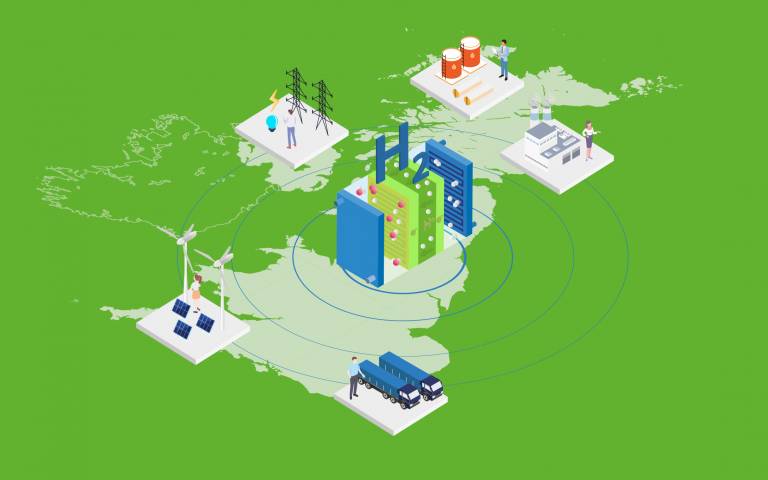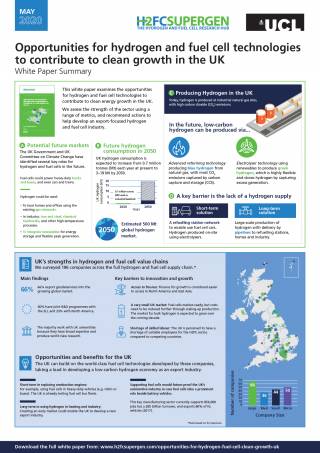Opportunities for hydrogen and fuel cell technologies to contribute to clean growth in the UK
23 June 2020
The Institute for Sustainable Resources has produced a new report examining the opportunities for hydrogen and fuel cell technologies (H2FC) to contribute to clean growth in the UK.

Hydrogen is expected to have an important role in decarbonising several parts of the UK energy system. The longstanding hydrogen research programme at ISR has identified a number of potential roles for hydrogen and fuel cells:
- Fuel cells can power all types of vehicles, including cars, trucks, buses and trains.
- Hydrogen could be used instead of natural gas to power homes and businesses.
- Hydrogen could integrate renewables and provide energy storage and flexible peak generation.
The report assesses the strength of the existing H2FC sector by surveying 196 companies working in the area and by using a range of metrics such as publication citations and patents. It finds an emerging UK fuel cell industry working at the cutting edge of global innovation. The UK has an opportunity to grow this area and to develop an export-focused hydrogen industry over the next few decades.
The report was written by Paul Dodds, Anthony Velazquez Abad, Will McDowall, and Gerard Fox. Dr Dodds said:
“Hydrogen and fuel cells are expected to have an important role in the journey to net zero emissions. The UK’s hydrogen and fuel cell industry is small, but has some world-leading technologies and is export-focused. We have identified a series of actions to grow the sector by fostering a UK market, and by creating and putting into practice a strategic vision.”
The report makes the following recommendations to help foster the H2FC industry in the UK:
- Create separate national fuel cell and hydrogen strategies. These should take UK energy needs, capabilities, and export opportunities into account. There is a need to coordinate public R&D support and to manage the consequences if European funding and collaboration opportunities become unavailable due to Brexit.
- Create a public–private “Hydrogen Partnership” to accelerate a shift to hydrogen energy systems in the UK and to stimulate opportunities for businesses.
- Invest in infrastructure to underpin nascent fuel cell and hydrogen markets, including a national refuelling station network and a green hydrogen standard scheme.
- Study what would constitute critical mass in the hydrogen and fuel cell sectors, in terms of industry and academic capacity, and the skills and knowledge base, and consider how critical mass could be achieved most efficiently.
- Create a “Hydrogen Institute” and an “Electrochemical Centre” to coordinate and underpin national innovation over the next decade.
The report was funded by the The Hydrogen and Fuel Cell Research Hub and was launched with a live Hub webinar attended by over 270 people from across the world.
Further information
- Download the report
- Visit The Hydrogen and Fuel Cell Research Hub website
- View Dr Paul Dodds’ profile
- View Dr Will McDowall’s profile
 Close
Close


